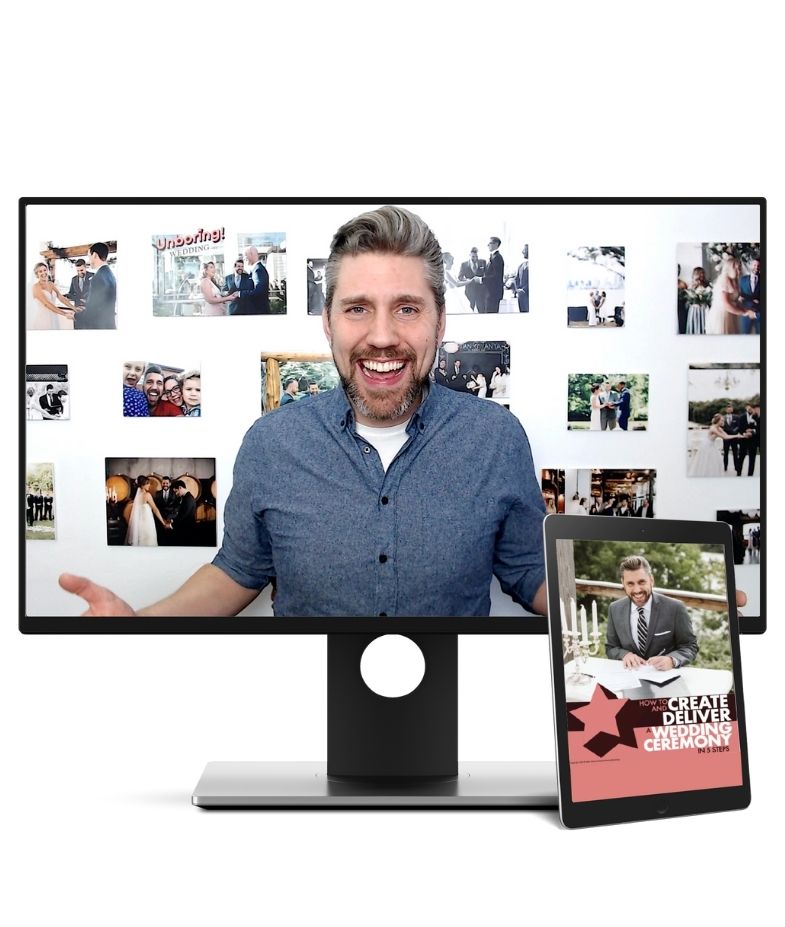It’s common for us wedding officiants to feel a lot of pressure about that first consultation meeting with a prospective client.
What do I say? How do I structure the conversation? Is there a best way to do this?
As a full-time professional wedding officiant, I run these first meetings with couples once or twice a week on average. I’ve honed my method over years, and I feel like I’ve hit on a routine that works.
Now, I call this first meeting our “chemistry check.” It’s more… human (or something), than “initial consultation.”
Ultimately, our objective here is to have a successful chemistry check meeting.
What Success Means
It’s tempting to think that a successful chemistry check means “we landed the couple for their wedding.”
But landing the client is not necessarily the best outcome of the meeting.
In fact, the couple might not be right for us, because they have certain expectations we won’t meet. Likewise, we might not be right for the couple based on our personal style or our non-negotiables.
So a better definition of success coming out of the chemistry check is this: “Both I, as the wedding officiant, and they, as the couple getting married, have a clear sense of each other’s vision, style, and expectations.”
Here are 8 steps to guaranteeing a successful outcome.
1. Do a bit of research on their venue ahead of time
I’ve found that when I ask couples specific questions about their venue, they connect with me stronger than when I used to ask, “So, what’s the venue like?”
That’s one of the reasons I always ask for the venue on my enquiry form.
It’s best to do a bit of research about their venue ahead of time.
Whenever I have a chemistry check meeting, I try to make sure I arrive at the coffee shop about half an hour early. Then I start Googling up their venue. I do it just before the chemistry check so the venue is fresh in my mind when the couple arrive.
Take a place like The Aperture Room, for example. A quick Google search of “the aperture room toronto” brings up all sorts of pictures of the place. When I know what the room looks like and all the features that make it stand out (like large windows, exposed brick, fireplaces, etc.) and how the seats are oriented, I can really engage in a dialogue with the couple about how the ceremony is going to look.
“I love the huge windows on the side wall. Will we be standing in front of the fireplace?”
And that leads into nailing Step #2.
2. Ask questions about their vision for the wedding
With a solid idea of what the venue looks like, I always kick off the conversation by complementing the couple on their choice of venue and referencing specifics of how the setting will make for a beautiful ceremony.
And when I’ve demonstrated that I’m on the same page with them and I love where they’ve chosen to get married, then it’s important to start asking questions.
“Tell me a bit about your vision for the ceremony. What’s the vibe you’re going for?”
“About how many guests are you inviting?”
“How many people will be in your wedding party?”
When the couple start talking about their vision for the day, two things happen. First, we start to form a bond with them as we enter into their vision for the day. And just as importantly, we get a sense of whether our style matches their expectations.
We don’t want to commit to officiating a ceremony that doesn’t feel like a right fit with our style, right?
Asking lots of questions is the best way to find out.
3. Tell them your fee and when payments are due
I’ve learned a lot about initial client consultations from indie-startup gurus Chase, Corbett, and Steph at Fizzle and the Courage and Clarity podcast. And one of the most valuable things they’ve taught me about talking to clients is this: lead with your fee.
It’s counterintuitive, I know.
Sometimes when we have a service-based business, we’re almost apologetic about the compensation we ask for. And then we make this one big mistake:
We save the price ’til the end.
So we have this great conversation with the prospective client where we talk about all that we provide and how we do it and why it’s great, and they’re getting excited. But they’re also wondering the whole time, “Gee, how much is all this greatness going to cost me?”
And then we drop the hammer at the end, and they have to come to terms with it – either accept or reject us based on the new information we’ve just hit ’em with.
Don’t do it that way.
It’s better to lead with our fee. Get it right out on the table. And then the rest of the conversation is adding value to that price tag.
“I charge $797. And here’s what you get. All travel included. Rehearsal. A planning session. A ceremony script. Your story. All the legal handling of your registration….” It’s half an hour of explaining and “selling” why the fee is utterly and totally worth it. No suspense. No big reveal or sticker shock at the end.
Think about it. Let’s say we don’t tell our fee up front. By the end of the conversation, the couple love us. They want us to officiate their wedding so badly.
Then we tell them our fee, and they can’t afford it. “She would have been so great, but… that fee!”
Now let’s go the other way.
We lead with our fee. Best case scenario: it’s no problem for the couple, and the rest of the chat is about confirming chemistry. Worst case scenario: right up front, the couple are put off. “No way we can afford that,” they think. But they stay with us, and throughout the course of the conversation they’re warming up to the value of our service and the fee we charge.
So they were either on board to begin with, or they never were anyways at that price. And then we get a chance to change their minds.
So, best practice: we get the fee on the table, and we tell them when they need to make the payments. Then the whole conversation becomes a talk about how we’re worth it.
There’s nothing to lose.
4. Describe the process of how their ceremony will come together
Next, I give the couple an option on what to do next: “do you want to pepper me with any questions you have? Or would you like me to give you my ‘spiel’ on the process of what it’s like to get from here to your wedding day?” Most opt for the spiel.
I start with how we’re going to meet up one more time in person for our wedding workshop. How, at the wedding workshop, we’ll go through every element of the basic 10-part wedding ceremony, and we’ll customize it fully. Then I’ll send them their script in a Google doc, and in the same email I’ll send them a Google Form with survey questions about their story. Then I’ll see them again at the rehearsal.
Whatever our specific process (every officiant is different), this is the time to give the couple a full and clear picture of what it’s like to be our client and how we go from zero to their perfect wedding ceremony script.
5. Tell them what you typically say for your officiant speech
The officiant speech is a big part of the ceremony, like it or not.
Think about the best wedding you ever attended. Now think of the worst. I bet the way you feel has something to do with what the officiant said and how long he talked.
So the couple are going to be keenly interested in what we’re planning to say for our part of the ceremony. Some couples want a sermon. For others, that’s the last thing they want. Some want the officiant to say nothing at all.
That’s why, after I talk to them about how the ceremony comes together, I tell them what I’m going to say. We talk about how I build out their story, find out what they love about each other, and get ahold of their friends and family.
“I’m going to tell your love story, say what you love about each other in the ceremony, and read what your loved ones love about you. Then I wrap up with a few brief words about commitment and why today is so sacred and important in your lives.”
That’s it. I tell them I’ll talk in their ceremony for about 9 minutes and then we’ll move on to the other elements like vows and rings from there.
6. Encourage them to ask any and all questions they have about you
So we’ve given them a full understanding of the process of building their ceremony and what we’re going to say. Now I ask them to fire away with any and all questions still on their minds.
Was there anything that they were wondering about as I was going through those details? Something I need to clarify? Anything I left out? Did they come with a list of questions for me?
Common questions here typically include:
How does the licence stuff work?
What if you’re sick on the day of our wedding?
When did you get into officiating and why do you do it?
I tell the couple: no question is off limits. I want them to get to know me and make the best choice for an officiant that’s right for them.
7. Tell them they don’t need to decide today
When their questions are exhausted, the couple usually look at each other and say something like, “Well, I think that about covers it.”
Then there’s a slightly awkward 1.4-second beat of silence. I recognize it every time, and I’m ready for it.
When it happens, that’s our cue to say, “Great! I’m not looking for an answer today. Go home, think about it, talk to other officiants, and get back to me over the next few days.”
Often the couple will ask me if I’ll give away their date if they don’t lock me down ASAP. The answer, of course, is, “Of course not.” I will wait for them to get back to me, and if they’re taking a bit too long and another couple enquires about their date, I’ll reach out to them first before meeting with the other couple.
8. Follow up with an email sampling your previous work
After our goodbyes, I make a point of strategically following up with an email that evening or the next morning.
I tell the couple what a pleasure it was to meet them, and then I send them the Google Doc linking to a sample wedding ceremony I’ve done – including the story. It gives them a sense of what their ceremony might be like.
I also send them the link to my podcast Unboring Wedding Day Love Stories where they can get a real sense of how their story might sound.
In this follow-up email, we want to bolster the couple’s sense that they get us, and they get what we do. We’re reinforcing our great first impression in our chemistry check, we’re making sure they see in black and white what we were talking about, and helping them get a vision for what could be on their big day.
Whether the couple go with us as their wedding officiant or not, these steps guarantee that we clearly understand each other’s vision, style, and expectations for the wedding day.
That’s chemistry-check success.

